
Francesco Clemente Giuseppe Sparanero, known professionally as Franco Nero, is an Italian actor, producer, and director. His breakthrough role was as the title character in the Spaghetti Western film Django (1966), which made him a pop culture icon and launched an international career that includes over 200 leading and supporting roles in a wide variety of films and television productions.

Poliziotteschi constitute a subgenre of crime and action films that emerged in Italy in the late 1960s and reached the height of their popularity in the 1970s. They are also known as polizieschi all'italiana, Euro-crime, Italo-crime, spaghetti crime films, or simply Italian crime films. Influenced by both 1970s French crime films and gritty 1960s and 1970s American cop films and vigilante films, poliziotteschi films were made amidst an atmosphere of socio-political turmoil in Italy known as Years of Lead and increasing Italian crime rates. The films generally featured graphic and brutal violence, organized crime, car chases, vigilantism, heists, gunfights, and corruption up to the highest levels. The protagonists were generally tough working class loners, willing to act outside a corrupt or overly bureaucratic system.

Enzo G. Castellari is an Italian film director, screenwriter and actor.
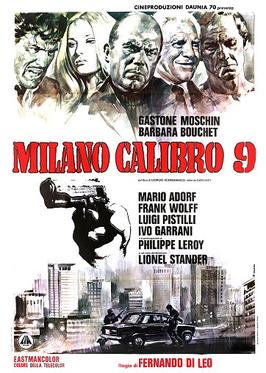
Caliber 9 is a 1972 Italian noir-poliziottesco film written and directed by Fernando Di Leo and starring Gastone Moschin, Mario Adorf, Barbara Bouchet, Philippe Leroy, Frank Wolff, Luigi Pistilli, and Lionel Stander. The film takes its title from the short story collection of the same name by Giorgio Scerbanenco, and is partially based on three of its stories. The musical score was composed by Luis Enriquez Bacalov and performed by the progressive rock band Osanna.

Fabio Testi is an Italian actor. After growing up witnessing film work done around Lake Garda, Testi entered the sets of the film and began work as a stuntman and a double on set, where he worked as a stuntman on The Good, the Bad and the Ugly. Testi continued stunt work and getting roles in low budget genre films until he was cast in Vittorio De Sica's film The Garden of the Finzi-Continis. Following this film, Testi became a star in Italy, appearing in some artistic films by Giuseppe Patroni Griffi and Claude Chabrol. Testi also continued to work in poliziotteschi genre films in the 1970s as well as a few gialli, and gained infamy for his publicised relationships with actresses Ursula Andress and Charlotte Rampling.
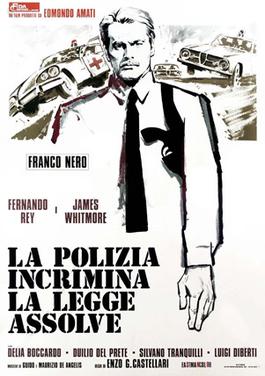
High Crime is a 1973 Italian-Spanish poliziottesco film directed by Enzo G. Castellari. The film stars Franco Nero, James Whitmore, Delia Boccardo and Fernando Rey. High Crime was a big success at the time of its release, and helped popularize the Italian cop thriller genre.

Keoma is a 1976 Italian spaghetti Western film directed by Enzo G. Castellari and starring Franco Nero. It is frequently regarded as one of the better 'twilight' Spaghetti Westerns, being one of the last films of its genre, and is known for its incorporation of newer cinematic techniques of the time and its vocal soundtrack by Guido & Maurizio De Angelis.
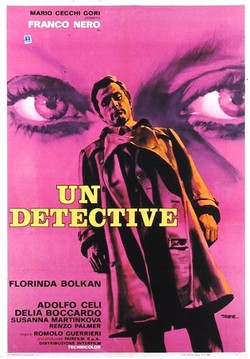
Detective Belli is a 1969 Italian poliziotteschi directed by Romolo Guerrieri and starring Franco Nero. It is based on the novel Macchie di belletto by Ludovico Dentice.
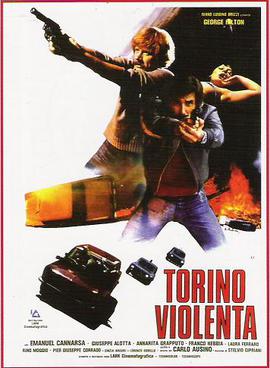
Double Game, also known as Violent Turin, is a 1977 poliziotteschi film. The film is directed by Carlo Ausino and stars George Hilton.
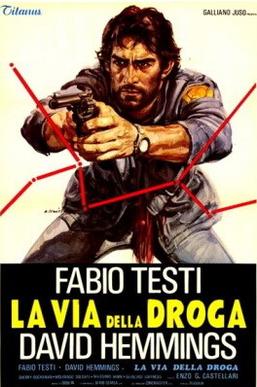
The Heroin Busters is a 1977 Italian crime film directed by Enzo G. Castellari and starring Fabio Testi, David Hemmings and Sherry Buchanan.

The Cynic, the Rat and the Fist is an Italian poliziotteschi film directed in 1977 by Umberto Lenzi and third entry into the Tanzi/Moretto/Monnezza shared universe as well as serving as a direct sequel to The Tough Ones. The film was described by Italian film critic and historian Roberto Curti as "a sequel of sorts" to Lenzi's 1976 The Tough Ones, with Maurizio Merli reprising the role of Inspector Leonardo Tanzi.

Leonardo Manzella, best known as Leonard Mann, is an American social worker, writer, and former actor. He played numerous leading roles in Italian genre films between 1969 and 1989, especially in Spaghetti westerns and poliziotteschi.

The Big Racket is a 1976 Italian poliziottesco film directed by Enzo G. Castellari. Fabio Testi stars as a police inspector who takes on a gang of hoodlums who terrorise an Italian city by extorting cash from local shop and bar owners.

The Shark Hunter, also known as Guardians of the Deep, is a 1979 Italian adventure film directed by Enzo G. Castellari.

Day of the Cobra is a 1980 Italian poliziottesco film directed by Enzo G. Castellari.

The House by the Edge of the Lake is a horror film directed by Enzo G. Castellari.

Jonathan of the Bears is a 1995 spaghetti Western film directed by Enzo G. Castellari. It was coproduced and filmed in Russia, where it was released as Месть - белого индейца.

Violent Rome is an Italian 1975 poliziottesco film directed by Marino Girolami It obtained a great commercial success and launched the career of Maurizio Merli. The film is the first entry into the Commissioner Betti Trilogy.

Oasis of Fear is a 1971 giallo film directed and co-written by Umberto Lenzi, and starring Irene Papas, Ray Lovelock and Ornella Muti.

Manhunt in the City, also known as The Manhunt, is a 1975 Italian poliziottesco film directed by Umberto Lenzi. It was co-written by Dardano Sacchetti and has a score by Bruno Nicolai.




















